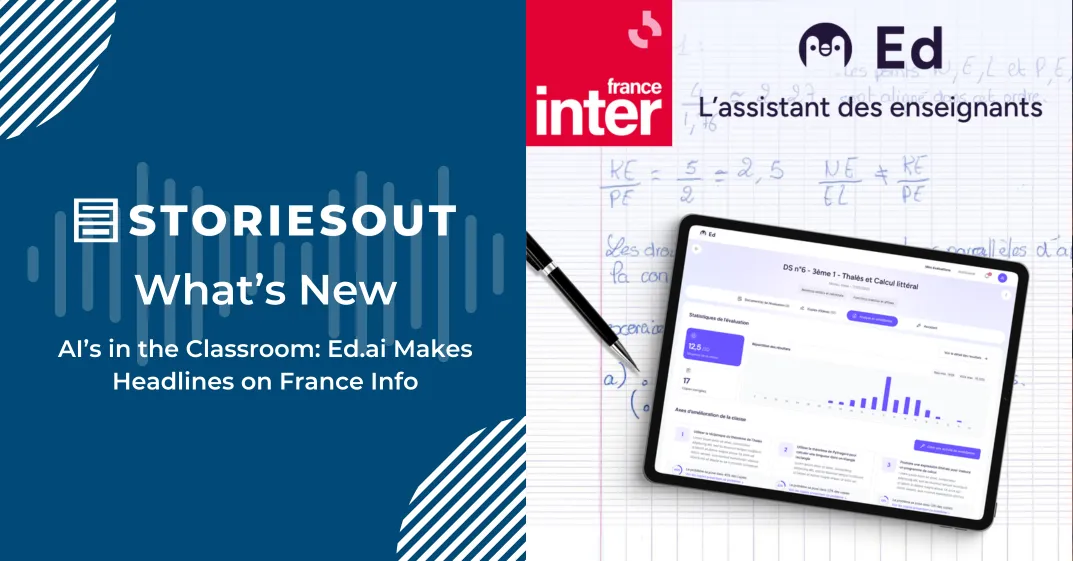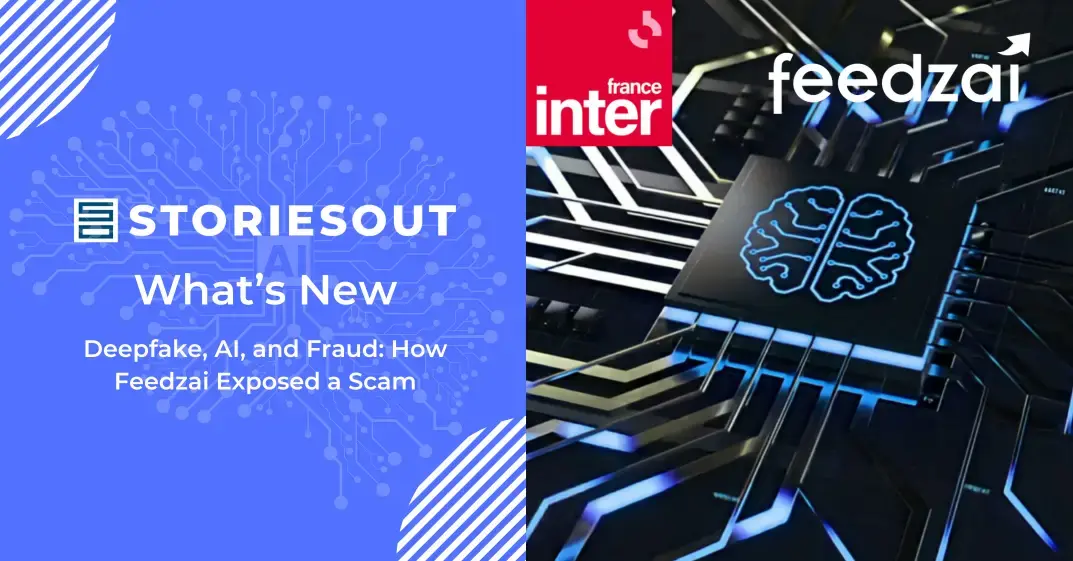Les 7 pépites de la semaine, trouvées dans // 7 nuggets found in
Vie publique – CNN – BBC – The Guardian – Dans Ta Pub – IT SOCIAL
🇫🇷 Voici le choix des attaché·es de presse StoriesOut 🙂
Loi SREN visant à sécuriser et à réguler l’espace numérique, votée le 21 mai 2024 🖥️🔒 Les prisonniers utilisent la VR pour se préparer à la vie après leur libération 🎮🚶 Record du monde battu pour l’organisme vivant avec le plus d’ADN 🧬🌍 Pourquoi les trackers de santé peuvent vous éloigner du chemin du bien-être ⌚🚫 Citroën met fin aux privilèges électriques dans une campagne révolutionnaire 🚗⚡ Comment une bouilloire pourrait aider à protéger les personnes âgées 🔥👵 L’impact de l’intelligence artificielle sur l’emploi et les compétences, la révolution est en marche 🤖💼
🇬🇧 The weekly news selection by StoriesOut media consultants 🙂
French SREN law aiming to secure and regulate the digital space passed on May 21 🖥️🔒 Prisoners are using VR to prepare them for life after release 🎮🚶 World record broken for living organism with most DNA 🧬🌍 Why health trackers can push you off the path to wellness ⌚🚫 Citroën ends electric privileges in a revolutionary campaign 🚗⚡ How a kettle could help keep older people safe 🔥👵 The impact of Artificial Intelligence on jobs and skills, the revolution is underway 🤖💼
#1. Loi du 21 mai 2024 visant à sécuriser et à réguler l’espace numérique
Filtre anti-arnaque, blocage rapide des sites pornographiques accessibles aux mineurs, peine de bannissement des réseaux sociaux pour les cyber-harceleurs… Voici quelques-unes des mesures de loi dite SREN pour mieux réguler l’espace numérique et protéger les internautes, notamment les plus jeunes, ainsi que les entreprises.
La loi s’inspire notamment des recommandations de trois rapports parlementaires sur l’industrie pornographique et sur la souveraineté numérique. Elle résulte également des règlements européens sur les services numériques (DSA) et sur les marchés numériques (DMA).
👉 Loi du 21 mai 2024 visant à sécuriser et à réguler l’espace numérique
#2. Prisoners are using VR to prepare them for life after release
In her first week of job training, Tiffany Joseph Busch learned how to do an oil change. “If I had known it was this easy then I wouldn’t have been paying for oil changes,” she said she told her instructor.
But Busch never interacted with an actual car during the training. Instead, she learned in a virtual garage, using a Meta Quest virtual reality headset.
Busch, 36, is incarcerated at the Maryland Correctional Institution for Women and is part of an early group of trainees learning skills in virtual reality that will prepare them to pursue jobs as auto technicians upon their release. For Busch, who expects to be released in June after being incarcerated on-and-off since age 19, the program will give her a crucial head start in rebuilding her life outside of prison.
👉 Prisoners are using VR to prepare them for life after release
#3. World record broken for living thing with most DNA
A fern has entered the record books for having more DNA than any other living thing.
The plant’s genetic material, or genome, would reach about 100 metres when unravelled, outstripping Big Ben.
Scientists say it’s a “crazy” amount of DNA for a tiny plant that most people would walk by without noticing.
“It’s the biggest genome that has ever been discovered out of all organisms that live on this planet,” Dr Ilia Leitch of the Royal Botanic Gardens, Kew, told BBC News.
“How does it function? How does it survive with that much DNA in it?”
👉 World record broken for living thing with most DNA
#4. Why health trackers can push you off the road to wellness
As we know more about our bodies, from wearable tech to data feedback, so our health anxiety increases. So is it better not to know?
One thing led to another and then I was topless on a couch and then a cardiologist, his nose wrinkled, was explaining that everything was fine, except my heart was a bit… weird? I can’t remember the exact words, but they amounted, I think, to slightly more than “eccentric”, far less than bizarre. Though he was investigating something else entirely, he’d noticed that a valve up in there was slightly odd, definitely unrelated to the issue I was here for, and unlikely to impact my future health in any way. But now that he’d seen it, he thought it best to tell me. It’s better to know, though, I asked, right? He shrugged. “Sometimes?” he said, non-committal. “It’s complicated.”
👉 Why health trackers can push you off the road to wellness
#5. Citroën met fin aux privilèges électriques dans une campagne révolutionnaire
L’industrie automobile connaît une révolution avec l’introduction de l’ë-C3 de Citroën. Historiquement, les voitures électriques étaient réservées aux ultra-riches ou aux fervents défenseurs de la cause écologique.
Cependant, Citroën change la donne avec l’ë-C3, un véhicule électrique accessible à partir de 23 300 € ou 99 €/mois, rendant ainsi la mobilité électrique disponible à un plus large public. C’est une véritable démocratisation de l’électromobilité, marquant un changement de paradigme significatif dans le marché automobile.
👉 Citroën met fin aux privilèges électriques dans une campagne révolutionnaire
#6. How a kettle could help keep older people safe
AI linked to every day items like kettles and showers could alert family members if their elderly relatives have diverted from their normal morning routine.
The system, being trialled by Censis, learns typical activity of of someone living alone and aims to spot any erratic behaviour, helping to identify when they may have issues.
If Allan Fraser, 94, fails to make his usual morning cup of tea at his home in Buckie and does not respond to an automated text message, then his son will be alerted.
Allan is one of 19 households across Dundee, Glasgow and Buckie taking part in the trial, which Censis hopes to roll out on a larger scale.
👉 How a kettle could help keep older people safeX
#7. L’impact de l’intelligence artificielle sur l’emploi et les compétences, la révolution est en marche
L’arrivée de l’intelligence artificielle dans le paysage informatique mondial a bouleversé de nombreux secteurs, notamment celui de l’emploi et des compétences. Cette évolution rapide a des conséquences importantes sur le marché du travail et la nature des compétences requises pour les emplois de demain.
L’irruption impromptue de l’IA dans le paysage informatique mondial a rebattu les cartes de bien des domaines, y compris de l’emploi et des compétences. Le phénomène est
récurrent : au 19ème siècle, l’industrialisation a transformé de nombreux secteurs, notamment l’agriculture et la fabrication.
👉 L’impact de l’intelligence artificielle sur l’emploi et les compétences, la révolution est en marche





